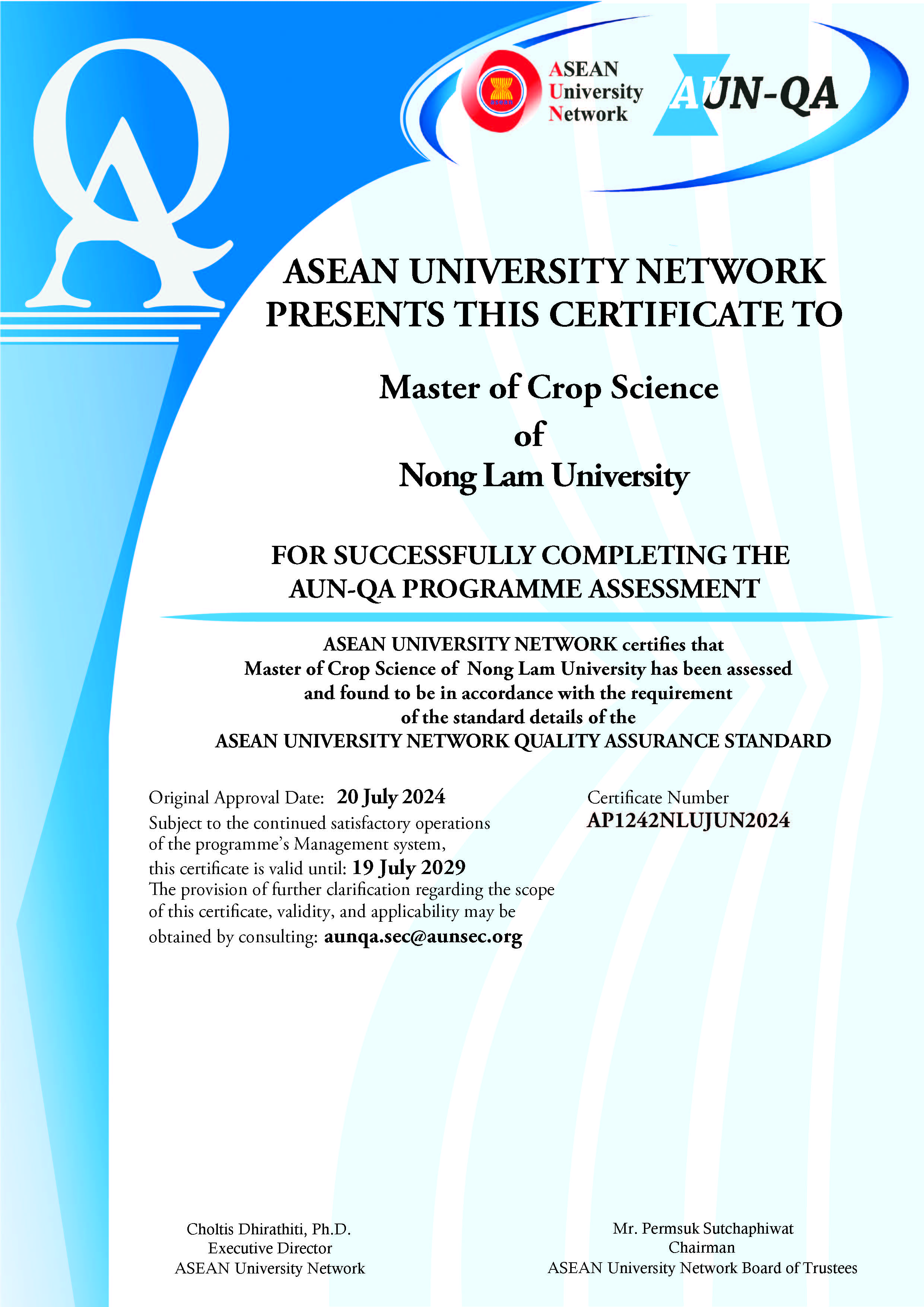MINISTRY OF EDUCATION AND TRAINING SOCIALIST REPUBLIC OF VIETNAM
Nong Lam University HCMC Independence – Freedom – Happiness
FACULTY OF AGRONOMY
Ho Chi Minh City, August 5th, 2024
TRAINING PROGRAM LEARNING OUTCOMES
FULLTIME BACHELOR LEVEL
Agronomy major
- Program’s name (Vietnamese): Nông học
- English name: Agronomy
- Training level: Bachelor
- Training major: Agronomy
- Program code: 7620109
- Training type: Fulltime
- Training time: 4 years
- Degree: Bachelor of Engineering in Agronomy
I. TRAINING OBJECTIVES
1.1. Goals
The general objectives of the Bachelor of Engineering in Agronomy (BEA)Program is to train high-quality Agronomy engineers who meet the requirements of the labor market and international integration; have solid knowledge and good skills in professional activities; have good production management capability, be dedicated to the profession, serve not only the domestic labor market but also the markets of countries in the region and the world; contribute to building and developing a sustainable cropping system in a modern, safe and effective direction.
1.2 Specific objectives
From the general objectives, the specific objectives (abbreviated as PO) of the Crop Science are provided to the learner as follows:
PO1: Provide students with basic knowledge, fundamental and specialized professional knowledge in agriculture.
PO2: Equip students with professional skills, creative thinking, problem solving skills to apply knowledge in agriculture to work, research and transfer technology.
PO3: Provide students with communication skills, independent and group working to efficiently conduct work and research in the field of agriculture.
PO4: Equip students with the abilities to conceptualize, plan and implement technical and economic solutions for crop production systems.
PO5: Instill in students proper awareness and attitude in grasping social needs, fulfilling social duties, respecting and protecting professional ethics, and having a sense of lifelong learning.
II. PROGRAM LEARNING OUTCOMES
Besides the general requirements on professional ethics, compliance attitude towardprofessional safety principles, political reasoning competence, national defense - security knowledge according to current regulations and meeting standards of basic information technology skills according to current regulations on Information Technology Skill Standards issued by the Ministry of Information and Communications, students after graduating from the BEA Program must meet the following minimum capability requirements, specified into Program Learning Outcomes (abbreviated as “PLOs”):
A. KNOWLEDGE
General knowledge
PLO1: Utilize major’s fundamental knowledge to explain phenomena related to crop production.
PLO2: Utilize major’s fundamental and specialized knowledge to develop efficient, practical crop production procedures.
Professional knowledge
PLO3: Analyze the effects of cultivation techniques on growth, development, yield and quality of crops.
PLO4:Propose suitable technical solutions to resolve issues related to crop production.
PLO5: Improve crop production procedures for efficiency and practicality.
B. SKILLS
Genericskills
PLO6: Utilize English, basic office IT applications and specialized software proficiently to analyze and synthesize data scientifically.
Professionalskills
PLO7: Deploy professional activities related to crop production.
PLO8: Organize professional activities related to crop production.
PLO9: Transfer scientific research results into practical production.
PLO10: Manage professional activities related to crop production organization.
PLO11: Consult about efficient, practical crop production techniques.
C. Independence and professional ethics
PLO12:Practice self-research and lifelong learning.
III.ALIGNMENT BETWEEN PROGRAM OBJECTIVES AND PROGRAM LEARNING OUTCOMES
Table 1. Classification of the PLOs of the BEA Program
|
Program objectives
(POs)
|
Program Learning Outcomes (PLOs)
|
|||||||||||
|
1
|
2
|
3
|
4
|
5
|
6
|
7
|
8
|
9
|
10
|
11
|
12
|
|
|
1
|
1
|
1
|
|
|
|
|
|
|
|
|
|
|
|
2
|
|
|
2
|
2
|
2
|
|
|
|
|
|
|
|
|
3
|
|
|
|
|
|
3
|
|
|
|
|
|
|
|
4
|
|
|
|
|
|
|
4
|
4
|
4
|
4
|
4
|
|
|
5
|
|
|
|
|
|
|
|
|
|
|
|
5
|
Notes:
|
1
|
General knowledge
|
2
|
Advanced knowledge
|
|
3
|
Generic skills
|
4
|
Professional skills
|
|
5
|
Independence and professional ethics
|
||
IV. CAREER OPPORTUNITIES
The BEA Program provides students with the capability to meet the diverse needs of the labor market and international integration. After graduation, students can work at companies, factories, farms, state management agencies, universities and research institutes with job positions including:
- Research, teaching: working at research institutes, universities, colleges, vocational high schools in the field of crop production.
- State management, science and technology transfer: working at state management agencies (commune and district agricultural officials; People's Committees at all levels; Department of Agriculture and Rural Development, Department of Natural Resources and Environment, Department of Science and Technology); crop cultivation and plant protection agencies; agricultural extension agencies; plant protection bureaus; plant quarantine bureaus; agricultural service centers.
- Promoting products, production, business, providing agricultural services: working at agricultural material trading companies (seeds, fertilizers, plant protection chemicals); agricultural service companies (termite control, disinfection, inspection).
V. ABILITY TO LEARN AND IMPROVE QUALIFICATIONS AFTER GRADUATION
Graduates of the BEA Program have the capability of self-study and lifelong learning, self-development of their careers in the field of crop production; meeting the requirements for higher levels of study (Master, Doctor) in the field of crop production at domestic or abroad research institutes, training facilities or universities.
DEAN OF FACULTY
(signed)
Dr. Nguyen Duy Nang
Page count: 250
Last modify: 19-08-2025




